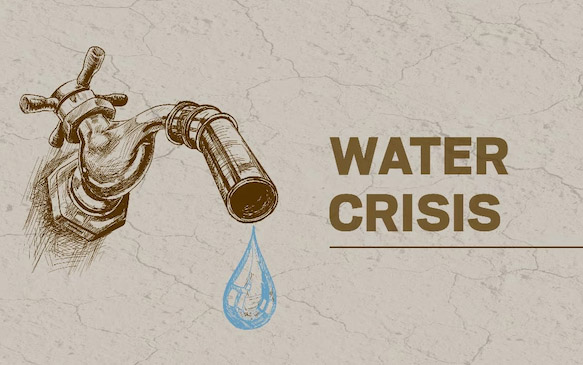The water crisis in Jammu has reached a critical juncture, exacerbating the hardships of residents amid soaring summer temperatures. The erratic water supply is a pervasive issue affecting numerous areas across the city and its outskirts. Residents throughout the region are grappling with severe water shortages, often resorting to purchasing water from private tankers at exorbitant rates. This situation is not merely an inconvenience but a profound disruption of daily life, affecting health, hygiene, and overall well-being.
Jammu’s water woes are multifaceted. The increasing temperature has significantly boosted the water demand, while the supply remains inconsistent and insufficient. Many areas report receiving water only once every seven to eight days, and even then, the supply is limited to a few minutes with low pressure. The Jal Shakti Department acknowledges the heightened demand, noting a 50 percent increase but is in no position to meet this demand. Despite yearly assurances, there has been no tangible improvement in the water situation in the last few years. Although water rents have increased exponentially, there is a notable absence of any strategy for augmenting water sources. Authorities were well aware in advance that the MCC would be enforced, yet no suitable adjustments were made for new tube wells. Practically, the focus remains on the already rapidly depleting groundwater, which is not a viable long-term strategy. Additionally, there has been no progress on the ambitious Mega Chenab Water Scheme. Last year, the JMC submitted a proposal worth Rs 1,276 crore to the Government for Chenab water supply, which remains in limbo. Similarly, 26 new deep drill tube wells were announced, but it appears that this summer, JMC and the Jal Shakti Department will again fail to bridge the water shortage in the region. The situation is further complicated by power cuts and low voltage. Over the years, no alternative power backup plans, such as solar panels or diesel generators, have been implemented.
Authorities must understand that water is a basic necessity of life, and passing the buck year after year will not resolve the persistent water shortages. It is important to adopt a comprehensive and sustainable approach to address this recurring crisis. The impact of this crisis extends beyond mere inconvenience. People recount their struggles with accessing basic water supplies, and these stories are echoed throughout Jammu, painting a picture of widespread distress and frustration. The working class is the worst affected, as they never know when the water will be supplied. This unpredictability disrupts daily routines and forces families to constantly adapt to an unreliable system. Additionally, the suspension of new water connections until September exacerbates the issue, as it prevents new households and businesses from accessing municipal water.
Addressing Jammu’s water crisis requires a multifaceted approach that goes beyond temporary measures. Immediate steps, such as expediting the activation of the new tube wells and ensuring consistent power supply to water pumping stations, are essential. Investment in infrastructure is crucial. This includes modernising pipelines to reduce leakage and waste, which currently account for significant water losses. Implementing comprehensive water conservation programmes can mitigate the impact of future shortages. Encouraging the installation of rainwater harvesting systems in homes, offices and public buildings can help replenish groundwater levels. Authorities must pursue the Chenab water supply scheme, as that seems to be a viable long-term solution to the persistent water crisis. Moreover, the Government should explore alternative water sources, such as recycling, by establishing treatment plants to purify greywater for use in agriculture, landscaping and industrial processes to conserve fresh water for essential domestic use.
The water crisis in Jammu is a pressing issue that demands immediate and sustained action. Jammu must get a resilient water supply system that meets the needs of its residents even during peak demand periods. The time to act is now, before the situation escalates further, impacting more lives and further straining the city’s resources.
Trending Now
E-Paper


